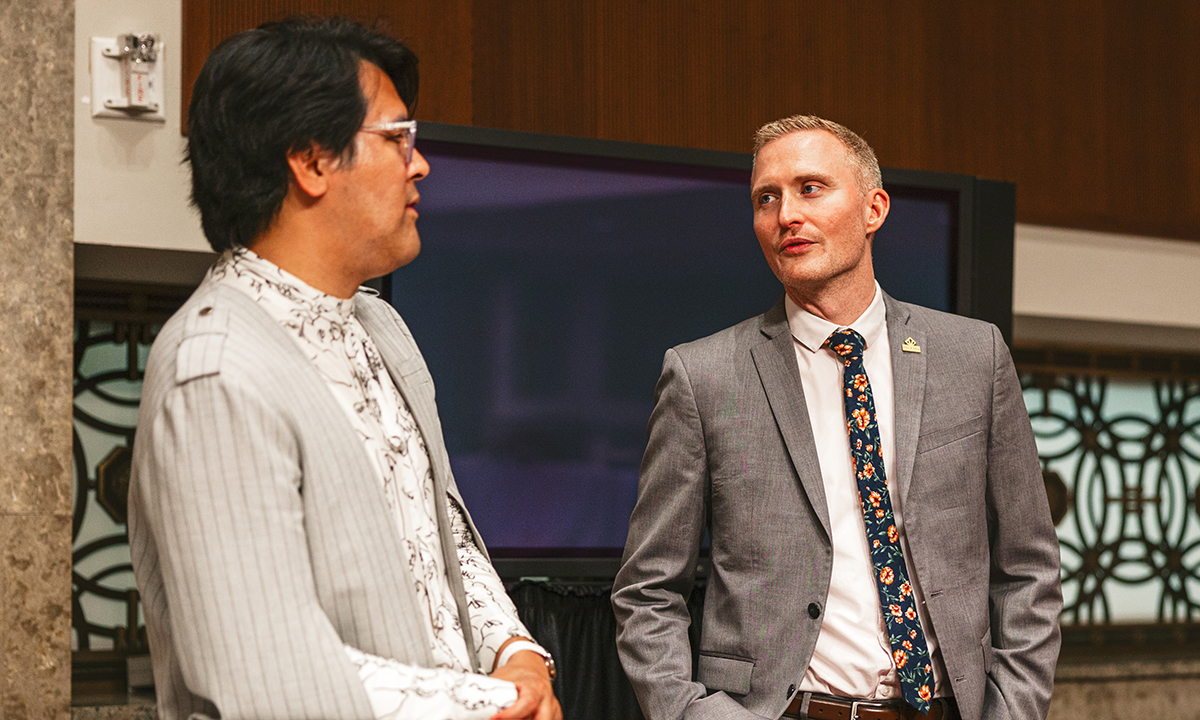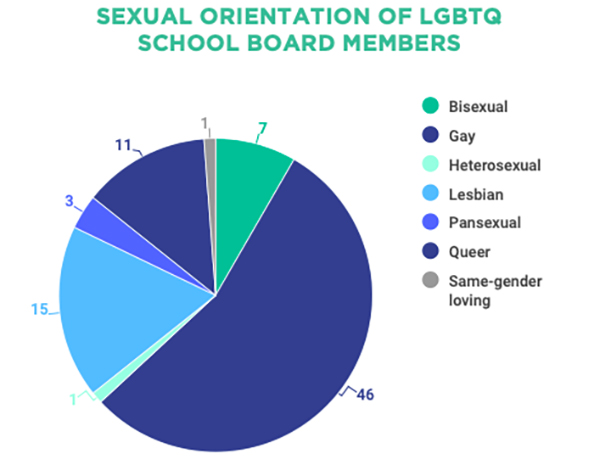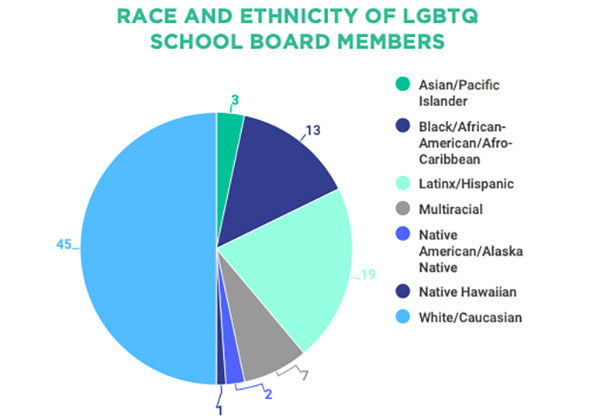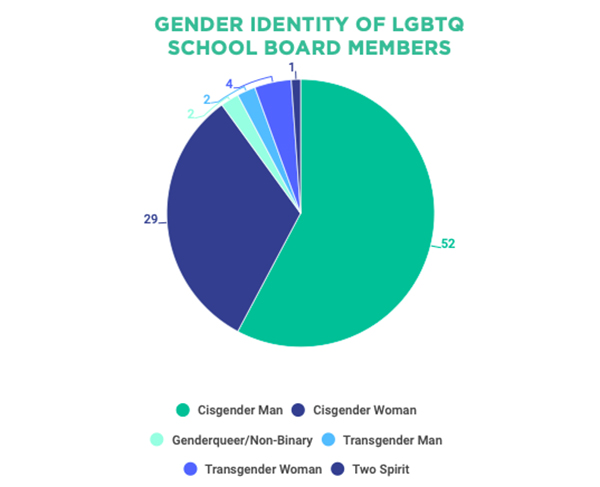There Are Just 90 LGBTQ School Board Members. Half Were Threatened, Harassed
'Few and Under Fire': With LGBTQ student rights under assault and out elected officials facing attacks, Victory Institute seeks more candidates to run

Get stories like this delivered straight to your inbox. Sign up for The 74 Newsletter
As collected by the Victory Institute, a clearinghouse for LGBTQ candidates and elected officials, the numbers of queer school board members are eye-popping. Of the approximately 90,000 U.S. school board members, 90 — 0.1% — are known to be LGBTQ.
Most of those out board members are gay cisgender men. Just 29 are cisgender women, four are trans women, two are trans men and two nonbinary. They serve in 28 states, frequently as the only openly queer school board member in their state.
Given that 7% of the adult U.S. population identifies as LGBTQ, to achieve equitable representation on school boards, voters would need to elect 6,300 more. This year, there are 82 LGBTQ school board candidates, up from 34 in 2018.
In a recent survey, “Few and Under Fire,” the organization asked LGBTQ board members about their experiences seeking and holding office. Almost half — 47% — of those who responded told the Victory Institute they had been harassed as candidates, while 51% have been verbally assaulted in office — sometimes by a fellow board member. A third have faced threats to their safety, and more than 6% have been threatened with death.
Almost all — 87% — have put forward pro-LGBTQ policies during their time on their board, with 62% saying supporting queer students was a primary reason they ran. One third say that candidates with anti-LGBTQ platforms are currently running for their boards.
Elliot Imse, executive director of the institute and an author of the recent report, talked to Beth Hawkins about what the numbers mean and what he hopes will happen.
This conversation has been edited for length and clarity.
The 74: Tell us why you did this survey.
Elliot Imse: Right now, LGBTQ people are severely underrepresented on school boards across the country. And the reality is anti-LGBTQ activists are executing on a strategy to flood school boards with extremists who are looking to take away the dignity and rights of LGBTQ students. The best way, perhaps the only way, to counter this is for LGBTQ people to run for school boards, to insert their voices and their votes.
We know from the report that running for school boards is not easy. You face harassment, you face discrimination. But it’s vital at this point for LGBTQ young people that we do step up.
How did you gather this data?
Victory Institute houses the most comprehensive database of U.S. LGBTQ elected officials, which is displayed on our Out for America map. We do a ton of outreach to state groups and do surveys to try and find all our LGBTQ elected officials. For this report specifically, we sent a survey to the known LGBTQ elected school board members and received responses from a little more than half of them, which is not bad for an email survey.

What did you hear that surprised you?
What we found was not as much surprising as reaffirming our fears of what school board candidates and members face. Almost half have been the target of anti-LGBTQ verbal attacks as a candidate. More than half have been the target of anti-LGBTQ verbal attacks as a school board member. That is an extraordinary number. When you think about how local some of these races are, these verbal attacks are often coming from neighbors, or people in their communities, and can be extremely threatening for a lot of obvious reasons.
That is a strategy being pushed forward by anti-LGBTQ extremists, where they are trying to get LGBTQ people to be fearful of running for office or to leave office. And we have seen several LGBTQ elected officials recently leave office because of fear for their safety, their lives, because of a plethora of attacks on them because of their sexual orientation or gender identity.

Let’s flip this around and make the case for representation on school boards. These folks are isolated voices trying to protect kids and teachers.
With very few exceptions, we LGBTQ people are underrepresented in every legislative body in the United States. It’s not unusual for us to be the underdog or lone voice in the room. Yet we know that when LGBTQ people are serving on school boards, or in other elected positions, it changes policy debates, it changes hearts and minds, and it leads to more inclusive policies and legislation. When LGBT people run or serve, it changes the perceptions not just of their constituents, but also their colleagues.
Which congressman was it who said, essentially, “Dang that Tammy Baldwin for not going away”?
As [Florida Republican Sen.] Marco Rubio was getting into an elevator, he told a reporter, “Marriage equality isn’t important to be talking about right now.” [Wisconsin Democratic Sen.] Tammy Baldwin happened to be in the elevator he was walking into as the doors closed. She told us that she did have some words for him. She wouldn’t be specific, but she’s like, “Trust me, there were words.”
In the room, in the elevator — it’s hard to say to a person’s face.
And it’s no accident right now. With the Respect for Marriage Act in the U.S. Senate, it is no accident that [New York Democratic] Sen. [Chuck] Schumer called on Sen. Baldwin to whip Republican votes. It is much harder to dehumanize someone when you’re talking to that person, versus when they are an abstract community in people’s mind.

What are you hearing from school board members in states where harmful legislation has been enacted or is dominating debate?
We’ve heard from a lot of school board members who are exhausted. It’s extremely exhausting to be playing defense so often, and when that defense is simply protecting the basic needs of LGBTQ students. Adding to that threats that you receive online, via phone, via email. It takes a toll. And these are not positions that are paying full-time salaries.
It’s hard to take. It takes a courageous and leadership-driven person to run for these positions, recognizing that it can be an uphill battle. That said, plenty of our school board members are in more liberal districts where they’ve been able to get great policies passed, and in purple districts where they’ve been able to get basic protections passed for LGBTQ students. It’s not all doom and gloom.
In our report, one third of school board members said there are candidates running for their school board who are championing an anti-LGBTQ platform. So the importance of having them there is real.
Do they have support mechanisms?
At the Victory Institute, we try to support our network of LGBTQ elected officials across the country. We hold events, conferences, convenings to bring LGBT officials together, including school board members. It’s partially about discussing issues, but part of it is networking, which turns into support. Having them be in touch with each other is really important. They need that solidarity to be able to share what they’re going through.
What would encourage more LGBTQ people to run for local office?
Awareness. We work to ensure the community knows and understands the importance of LGBTQ people getting elected, and to help train them to run for these hyperlocal, local and state legislative positions. But it’s also helping LGBTQ people understand that they are qualified for these positions. Whereas a white, straight, cisgender man tends to always think they’re qualified for whatever position is in front of them, we know that LGBTQ people — like women, like people of color — need to be asked more times before they consider a run for office.
Letting people know that if they have been involved in their communities, they’ve been involved in their children’s education, if they’re a teacher, they are qualified to serve on a school board. Their perspectives are valid. That is huge.
Get stories like these delivered straight to your inbox. Sign up for The 74 Newsletter

;)
